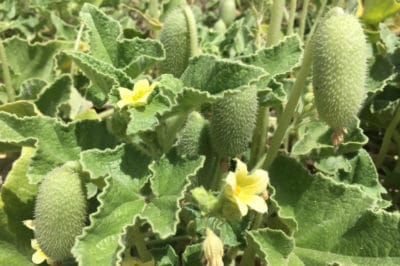What Wild Cucumber Does
When it comes to concealing garden eyesores, wild cucumber vine has few equals. Its stems of lush, light-green leaves can spread 25 feet over the span of the summer. And once their tendrils latch on to a support, removing them is a battle. If the goal is to hide a large area in a short time, this is your plant.
Where Wild Cucumber Grows
In the wild, look for these annual vines wherever there’s water — along creeks and streams, near ponds and in wet bottomlands. While cultivated cucumbers need at least six hours of daily sun to perform their best, the vines flower and fruit very well wherever they get four or more hours.
Life Cycle
After sprouting in the spring, wild cucumber vines climb toward the sunlight by clinging to the branches and stems of nearby vegetation. Beginning in August, their flowers appear, followed by green, bristle-covered “cucumbers,” each containing four large seeds. By mid-fall, the 2-inch fruits have dried out and expelled their seeds onto the ground to germinate the following spring.
Expert gardener’s tips:
- Not only is wild cucumber vine fruit inedible; some people experience a burning sensation from touching the soft bristles that cover it.
- One wild cucumber vine may spread 65 feet in a single summer, dropping seeds along much of its length. Without control, it will overrun its surroundings in a few years.
Ornamental Use
Even though its fruit is useless for pickling or food, wild cucumber does provide rapidly growing, attractive cover for fences, arbors or views you’d like to screen. The flowers provide late-summer interest, the dried fruits work well in floral arrangements and the seeds attract birds and wildlife.
Expert gardener’s tip: Avoid planting wild cucumber vine near any shrub or tree you don’t want to be covered. It could cut off their sunlight and interfere with photosynthesis.
